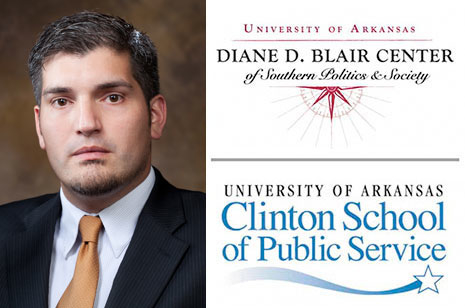
FAYETTEVILLE, Ark. – A political science professor at the University of Arkansas, using data from the Blair-Center-Clinton School Poll, found that foreign-born Latinos surveyed view the role of government differently than those born in the United States.
A greater percentage of foreign-born Latinos feel government-ensured equality with whites includes the areas of health care services, jobs and schools. Rafael Jimeno, an assistant professor of political science and the Diane D. Blair Professor in Latino Studies, attributes to gap to the socioeconomic distinctions between foreign-born and native Latinos.
When it comes to the issue of health care services, 73 percent of Latinos responded that they believe it is the responsibility of the government to make sure that minorities have equality with whites, even if it meant they would have to pay more in taxes to accomplish the goal. The nationally representative survey found that 55 percent of the population as a whole agreed.
The pattern also held true for government-ensured equality for housing (61 percent to 45 percent), schools (72 percept to 59 percent), jobs (64 percent to 45 percent) and treatment by courts and police (75 percent to 64 percent).
When broken down into attitudes among foreign-born and native-born Latinos living in the United States, the story deepens. As Jimeno further analyzed the health care data, 77 percent of foreign-born Latinos responded that the government should ensure equality, while 69 percent of native-born Latinos held the same view.
“Previous analysis has revealed differences between foreign-born and native-born Latinos when it comes to issues such as perceptions of other minority groups and various policy preferences,” Jimeno said. “Such findings add to an increasing body of research that highlights how subsets of the Latino community can be distinct from one another, especially when moving beyond traditional groupings based on country of origin or ancestry.”
Similar discrepancies among the groups were found when asked about the importance of other issues, such as the government’s role in ensuring equality in relation to employment and education. However, attitudes were virtually identical when asked about housing and treatment by courts and police. A breakdown of these numbers is contained in the full report.
These differences in attitudes toward policy initiatives may be rooted in socioeconomic differences as much as a respondent’s place of birth, Jimeno said. Foreign-born Latinos tend to be far less educated than native-born Latinos, he said.
Almost half (43 percent) of foreign-born Latinos reported that their highest level of education was less than high school, while less than one-fifth (17 percent) of the native-born respondents gave the same response. The gap also held true for income. More than half (53 percent) of foreign-born Latinos reported income levels of less than $35,000 per year, while roughly one-third (34 percent) of native-born Latinos were in the same economic category.
“The Latino immigrant population has socioeconomic pressures and needs that cannot be remedied without the support of government,” said Jimeno. “This is similar to other ethnic minorities in this country. It is important to have a more nuanced understanding of each community’s particular needs and how those needs impact policy preferences.”
Some proponents of reduced immigration levels or more punitive enforcement of U.S. immigration laws have asserted that Latinos are unwilling to learn English, but the data do not support this assertion. “Latinos report that retaining the ability to speak Spanish is just as important to them as learning to speak English.”
Again, when the Latino population is considered separately, based on place of birth, differences emerge. While both groups hold that learning English is vital, the research shows that the foreign-born are slightly more likely than the native-born to say that learning to speak English is “very important” (86 percent to 82 percent).
“Expecting government assistance does not mean failing to recognize one’s own responsibilities,” Jimeno said.
This is the seventh report of findings from the Blair Center-Clinton School Poll. Previous reports have included analysis of attitudes on southern identity, the economy, women in the workplace and immigration reform. Additional reports will be released throughout the year. For more information about the Blair Center-Clinton School partnership, visit the poll website.
The national sample included 3,606 respondents, with 1,792 participants living in the geographic South. The sample also included 1,110 Latino, 843 African American, and 1,653 non-Hispanic white respondents.
About the Partners:
The Diane D. Blair Center of Southern Politics and Society was established in 2001 by an act of U.S. Congress. This research center was named in honor of Diane Divers Blair who taught in the political science department of the University of Arkansas for 30 years. The Blair Center reflects her academic model and strives to approach the study of the American South from a variety of angles, attempting to reveal the undercurrents of politics, history and culture that have shaped the region.
The nation’s seventh presidential school, the University of Arkansas Clinton School of Public Service is the first school in the nation to offer a Master of Public Service (M.P.S.) degree, giving students the knowledge and experience to further their careers in the areas of nonprofit, governmental, volunteer or private sector service. Additionally, the mission of the Clinton School’s Center on Community Philanthropy, directed by Charlotte Williams, is to promote issues and research into community-based philanthropy and its role in generating social, economic and political change.
Topics
Contacts
Greg Steinsiek, director of communications
Clinton School of Public Service
501-683-5238, ghsteinsiek@clintonschool.uasys.edu
Darinda Sharp, director of external affairs and alumni outreach
School of Journalism and Strategic Media
479-595-2563,
dsharp@uark.edu